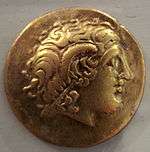Paemani
The Paemani (or Poemani or Caemani) were a tribe of Belgae in Gallia Belgica, mentioned by Julius Caesar in his commentary of his Gallic Wars as Germani.
In later records, during the time of the Roman empire, the Paemani are no longer mentioned. The old districts of the Condrusi and the Caeroesi are thought to have kept their names into the Middle Ages.
Name
The name appears as 'Caemani' in Caesar's accounts (mid-1st c. BC), and later as 'Paemani' or 'Paemanes'.[1]
A Germanic etymology from *haima- ('home') has been proposed for 'Caemani', although it cannot explain the attested spelling 'Paemanes' since Germanic sound laws rather predict a **Haemanes or **Chaemanes form.[2] The variant 'Paemani' could be of Celtic origin, and it appears closely related to the place names Poemaneni (Galatia) and Poemana (Celtic Hispania).[3]
The hypothesis that the name of the Famenne region may derive from Paemani, following the influence of the Germanic sound shift from p- to f-,[1] is now considered doubtful by most scholars,[4][5] which, according to Wightman (1985), "does not prove that they did not inhabit the region".[4]
Culture
They were one of a group of tribes listed by his local Remi informants as the Germani, along with the Eburones, Condrusi, Caeraesi (or Caeroesi), and Segni.[6] These tribes are therefore referred to as the "Germani Cisrhenani", to distinguish them from Germani living on the east of the Rhine, outside of the Gaulish and Roman area.
Whether this meant that they spoke a Germanic language or not, is still uncertain, but it was claimed by Tacitus that these Germani were the original Germani, and that the term Germani had come to be used broadly, having once only referred to this one people. He also said that the descendants of the original Germani in his time were the Tungri, who had changed their name.[7]
References
- Busse 2006, p. 199.
- Busse 2006, p. 200.
- Neumann 1999, p. 118.
- Wightman 1985, p. 31.
- von Petrikovits 1999, p. 93.
- Julius Caesar, Commentarii de Bello Gallico 2.4 and 6.32.
- Tacitus, Germania, II 2. ceterum Germaniae vocabulum recens et nuper additum, quoniamqui primi Rhenum transgressi Gallos expulerint ac nunc Tungri, tunc Germani vocati sint: ita nationis nomen, nongentis, evaluisse paulatim, ut omnes primum a victore obmetum, mox et a se ipsis invento nomine Germani vocarentur.
Bibliography
- Busse, Peter E. (2006). "Belgae". In Koch, John T. (ed.). Celtic Culture: A Historical Encyclopedia. ABC-CLIO. pp. 195–200. ISBN 978-1-85109-440-0.
- Neumann, Günter (1999). "Germani cisrhenani — die Aussage der Namen". In Beck, H.; Geuenich, D.; Steuer, H. (eds.). Germanenprobleme in heutiger Sicht. Walter de Gruyter. ISBN 978-3110164381.
- von Petrikovits, Harald (1999). "Germani Cisrhenani". In Beck, H.; Geuenich, D.; Steuer, H. (eds.). Germanenprobleme in heutiger Sicht. Walter de Gruyter. ISBN 978-3110164381.
- Wightman, Edith M. (1985). Gallia Belgica. University of California Press. ISBN 978-0-520-05297-0.CS1 maint: ref=harv (link)
